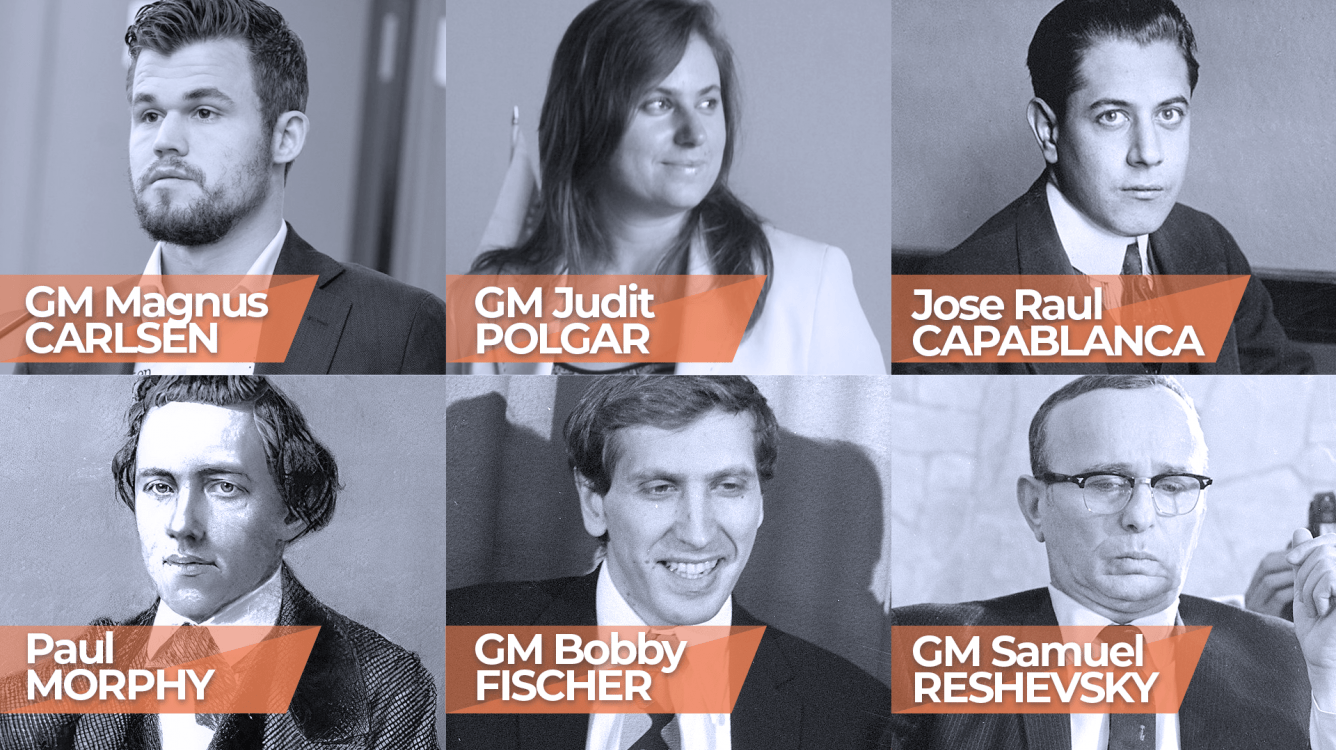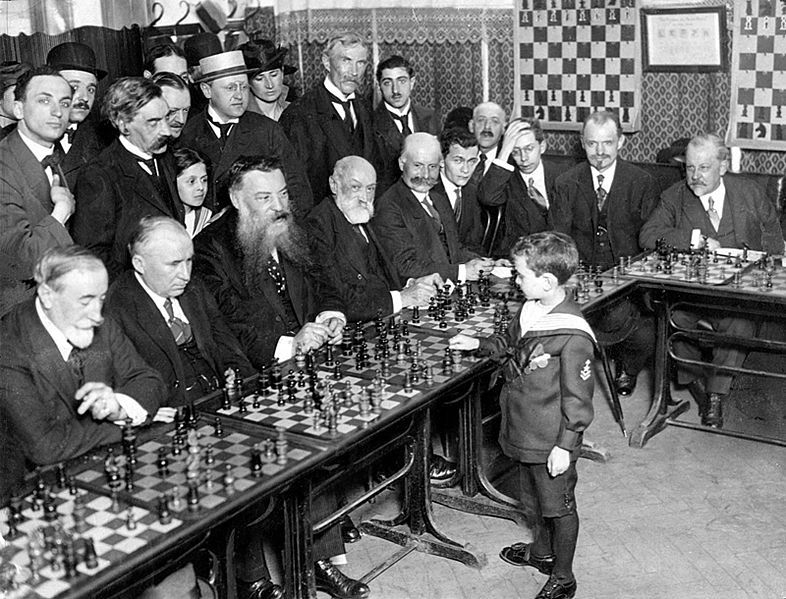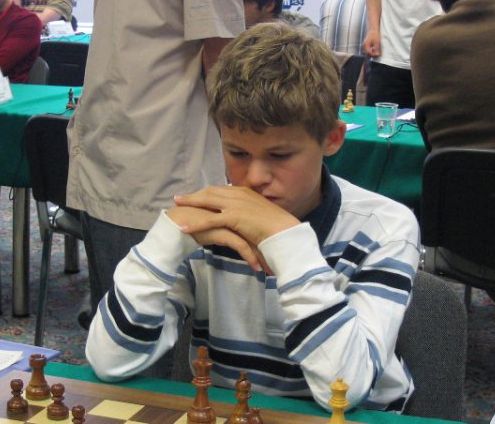
6 Greatest Chess Prodigies Of All Time
The main event of the 2021 Chess.com Junior Speed Chess Championship, where the world's best young players are competing for a $35,000 prize fund, is underway. Additionally, the record for youngest grandmaster in history was just set by IM Abhimanyu Mishra.
So what better time is there to talk about the greatest young players in chess history? Here are six amazing prodigies, in chronological order.
- Paul Morphy
- Jose Capablanca
- GM Samuel Reshevsky
- GM Bobby Fischer
- GM Judit Polgar
- GM Magnus Carlsen
- Conclusion
Paul Morphy
How did you learn how to play chess? Someone probably taught you the moves. But Paul Morphy was not a normal kid. As far back 1859, stories were being told of him learning the game just by watching his dad and uncle play.

Several stories about Morphy's youth must be considered legends that may or may not have actually happened. Notable among these would be his encounter with General Winfield Scott in 1846. It still makes for a great story: A general of the U.S. Army comes to New Orleans looking for the best local chess player and is presented with a nine-year-old kid. Insulted at first but convinced to play, Scott proceeds to get crushed.
Morphy definitely beat a master at age 13 though, against Johann Lowenthal.
By the time Morphy left New Orleans to play in a tournament for the first time, the 1857 American Chess Congress, he was already 20 years old. In an era where older players were still the top masters—or at least the most respected—that was impressive enough. He then scored +14 =3 -1 for an 86.1 winning percentage to easily win the event.
From there, he went to Europe, beat the continent's top player Adolf Anderssen in a match, played the most famous game of all time, came back to the United States, and retired at 22. Then, as he had prior to 1857, he stayed in New Orleans and only played casual odds games against family. The last record of such games is 1869, and he died 15 years later at 47. A tragic end for the world's first known chess prodigy.
Jose Raul Capablanca
Jose Capablanca's youthful chess exuberance is somewhat better documented than Morphy's. On the other hand, some of that documentation comes from Capablanca himself. The entire telling from Capablanca is a bit... something. He's not necessarily being self-serving; you just get the sense a 27-year-old Capablanca is sharing the only way he could conceptualize his chess experience at age four.
Capablanca is our source for the fact that he, like Morphy, learned how to play just by watching others move the pieces. While some of us spent years trying to beat our dad at chess, Capablanca said it happened his very first try.

In 1901, by now the ripe old age of 12, Capablanca played an exhibition match against the Cuban national champion Juan Corzo. Capablanca finished the match with a victorious score of +4 -3 =6. Although Corzo got some revenge and beat Capablanca twice while winning the 1902 Cuban Championship, Capa had already proved his mettle with games like this:
Capablanca eventually became world champion at age 32, defeating Emanuel Lasker in 1921. Lasker hadn't defended his title since 1910 and then World War I intervened, otherwise Capablanca might have become champion sooner. From 1916-1924, he famously did not lose a single tournament game during those eight years—a feat which will likely never be repeated.
GM Samuel Reshevsky
America's finest (we'll go with that) television producers once asked the nation, Are You Smarter than a 5th Grader? If they meant at chess and the fifth-grader was future GM Samuel Reshevsky, the answer for most people was no. Born in 1911, he put on several simultaneous exhibitions in Europe and the United States from 1919-21 and became a minor celebrity.
Unlike Morphy and Capablanca, there are a ton of pictures of young Reshevsky to choose from. Here's one:

Even masters had trouble with the prodigious Szmul (his birth name). Former world championship challenger David Janowsky lost to the kid when Reshevsky was just 10!
Like all great prodigies, Reshevsky continued to be tremendously successful into his adult chess career, and that despite putting it on hold for several years to complete his education and begin a concurrent career outside of chess. In 1948, he competed for the world championship title, tying for third place in a tournament won by GM Mikhail Botvinnik. Reshevsky ultimately played chess for about 75 years, with games in the record as early as 1917 and up to 1991.
GM Bobby Fischer
Reshevsky was in his 40s when news of another chess prodigy started to break through. Despite their shared background of youthful chess aptitude, Reshevsky and GM Bobby Fischer never cared for each other.

Fischer's win over IM Donald Byrne in the "Game of the Century," played in 1956 when he was 13, is extremely famous. (If you're not already familiar with it, definitely follow that link.) But do you know about this game, also featuring a queen sac, from when he was 17? Black usually avoids having to play ...Ne8 in the King's Indian Defense, but not Fischer here. It barely mattered.
Fischer turned just 15 in 1958, but he set several records that year. In his first time ever playing the event, he won the U.S. Championship in January while still 14, a record that remains unmatched. He didn't even lose a game, scoring +8 =5.
Later that year, Fischer placed sixth in the Portoroz Interzonal to set the record for youngest candidate for the world championship. The same result made him the youngest grandmaster in history, breaking a record previously held by a certain GM whom Fischer would grow accustomed to named Boris Spassky. Fischer kept the GM record for more than 30 years and the candidate record for nearly 50.
Fischer became world champ by the time he was 29. It was his tempestuous nature more than anything that kept Fischer, who spent most of 1961-72 as the most accurate player in chess, from winning the title even sooner, and from maintaining it once he did.
GM Judit Polgar
The greatest female player of all time, who was in the top 10 of all players in the world at her peak, GM Judit Polgar also broke Fischer's record for youngest grandmaster of anyone ever. Polgar's parents, Laszlo and Klara, may be the most successful chess parents ever, taking an active role in raising two grandmasters and an IM.

All three sisters—then ages 19, 14, and 12—represented Hungary at the 1988 Women's Olympiad, where they won gold. Judit was almost perfect, scoring +12 =1 for a performance rating of 2694, the best in the tournament. Here she drops her Bulgarian opponent in 17 moves with a queen sac:
By 1994, still a junior player at age 18, Polgar was board one for the main Hungarian team, ahead of GM Lajos Portisch. She could have been women's world champion for decades had she chosen to. Instead, she more than proved that capability playing in open events against the top players in the world and became one of the those top players herself, establishing her place in history.
GM Magnus Carlsen
He didn't intuit chess by apparent magic like Morphy and Capablanca, or give simultaneous exhibitions as a grade-schooler like Reshevsky, but GM Magnus Carlsen nonetheless developed into one of the two or three best chess players in history.
When Carlsen was 10, he was barely rated 900. By 13, he was the second-youngest grandmaster ever, with only GM Sergey Karjakin ahead of him at the time. (They are now second and eighth, respectively.) So, uh, something clicked.

By 15, Carlsen broke Fischer's record for youngest-ever world championship candidate by placing 10th in the 2005 Chess World Cup. Like Fischer, Carlsen was not yet near his eventual peak and did not threaten to win the Candidates, losing to GM Levon Aronian in the first round of a knockout format. But also like Fischer, Carlsen eventually would become world champion, except several years sooner thanks in part to a much more even temperament compared to Fischer.
Now best known for finding tiny advantages in equal-looking positions and grinding down his opponents, young Carlsen was a different beast. He played one of the most picturesque checkmates in chess history at age 13.
After going from a 900 rating at age 10 to world championship candidate at age 15, Carlsen was the #1 rated player in the world before he was 20, and world champion by 23.
Conclusion
None of these players, with the possible exception of Morphy, coasted on natural talent alone or stopped improving as they got older. Three of them became world champion officially, and four unofficially after counting Morphy. A fifth became the best female player ever. The last one, Reshevsky, was one of the strongest amateur players ever, making his living as an accountant and insurance salesman yet still reaching the top five in the world at his peak.
Who will be the next prodigy to reach these peaks? Karjakin played for the world championship in 2016 and pushed Carlsen to tiebreaks. Mishra just broke Karjakin's youngest GM record and it will be interesting to see where his chess develops from here. GM Alireza Firouzja, GM before age 15, is already top 12 by rating in the world despite just turning 18 in June 2021.
Remember to watch the Junior Speed Chess Championship, only on Chess.com, to see all of today's greatest prodigies in action!
Are there any prodigies you would rank among or above Morphy, Capablanca, Reshevsky, Fischer, Polgar, and Carlsen? Let us know in the comments!





